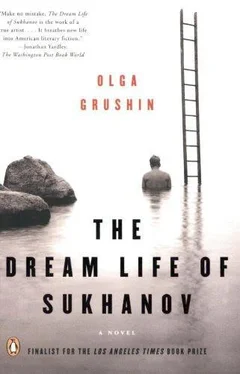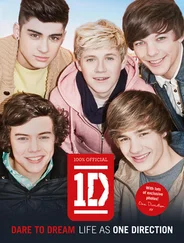“Sorry for the delay,” she said in a voice so low it verged on a whisper, as she slid the manuscript across his desk. He had meant to wait until she left the room, but his eyes descended onto the page before he could prevent it. “Chagall: One Man’s Universe,” the title declared in capital letters. Underneath, he saw the name—D. M. Fyodorov.
Exhaling, he picked up the article and dropped it negligently into his briefcase.
The relentless advance of the past had been finally halted.
“I’m going home now,” he said airily, “but tell Sergei Nikolaevich that I’ll let him know as soon as I can.”
“Yes, Anatoly Pavlovich,” Liubov Markovna whispered behind his back. “Of course, Anatoly Pavlovich. Right away, Anatoly Pavlovich.”
He had hoped to glance at the text during his metro ride home, but spent the minutes in transit with his nose pressed between the chintz shoulder blades of an elderly woman with a multitude of bags, one of which was quite perceptibly oozing a trickle of ice cream onto the floor, while a gangling, pimply fellow sank his chin meditatively into Sukhanov’s neck. On the way out, mildly befuddled, he attempted to exit through a glass door that read, in mirrorlike inversion, “ECNARTNE,” and a very large, formidable figure in a pigeon-gray uniform—whether man or woman, he could not tell—shouted at him in a booming prison guard’s voice that made passersby start and turn and stare, “Where the hell do you think you’re going, old man? Have you gone blind?”
He staggered into the street feeling shaky, tightly clutching his briefcase as if expecting it to be violently torn from his grasp at any moment. When he arrived at his building at last, he wanted to collapse with relief. The lobby embraced him with its familiar marble coolness, and the ancient concierge was already shuffling across the floor to summon the elevator. The two of them stood side by side without speaking, listening to the laborious creaking of the machinery floors above. Nearly a full minute later came a heavy thump, and a light shone through the crack between the folds of the door. The concierge began to swing open the gate.
“Oh, Anatoly Pavlovich, I nearly forgot,” he said in a voice dry as an autumn leaf. “There have been some problems with the elevator, so they asked me to tell everyone on the upper floors to be a bit more careful.”
“What do you mean?” Sukhanov asked inattentively, stepping inside.
“Oh, nothing much,” the concierge replied with an ambiguous smile. “Just make sure the elevator is actually there before you enter it on the way down. Wouldn’t want anyone falling to their deaths, would we now, heh heh heh! Had a close one, too. Two days ago, Ivan Martynovich—you know, that songwriter who lives below you—”
The elevator doors, closing with jerks and shudders, swallowed the rest of his sentence.
Sukhanov felt inordinately glad to find himself at home.
“Hello, I’m back!” he called out hopefully—but the place stayed silent, save for a few spoons that rattled dejectedly in the dining room cupboard. The air in the hallway was damp; the windows had remained open during the previous night’s rain. A ghostly trace of music sent faint vibrations into the corridor from Ksenya’s room. Frowning, he knocked on her door, then, not hearing a response, knocked louder. There was still no answer.
Sukhanov walked in.
The heavy green curtains were drawn, softening the room’s stark, book-filled angularity, and in the semidarkness he heard the shadow of music grow to a stronger presence, more like a whisper or a persistent memory of a song. His daughter was lying flat on her bed, fully dressed, a pair of headphones on her ears, her eyes closed, a strange, tight little smile flickering on her lips. As he bent over her, the music expanded, and he could distinguish a man’s voice singing, although the words remained a soft electronic blur.
“Young people nowadays,” he murmured—partially to dispel with the sound of his own voice the sensation of unease that suddenly brushed him with a darting, clammy, alien touch, not for the first time in Ksenya’s presence. After a moment’s hesitation, he placed his hand on her shoulder. She screamed and sat up so abruptly their heads nearly collided; and for an instant her eyes, dark and veiled, were full of swinging chaos. Then, like a pair of pendulums slowly coming to a stop, her pupils became still in the gray irises.
Breathing out, she tore off the headphones.
“You scared me,” she said. “I didn’t hear you come in.”
“Ah yes, the power of music,” he said, trying to smile. “What are you listening to?”
“No one you’d know.”
“Try me.”
“All right then, Boris Tumanov,” she replied, shrugging. “It’s a homemade tape, he’s part of the new underground.”
“Oh. I see,” he said vaguely. “By any chance, do you know where your mother is?”
“She’s gone to the Tretyakovka with Fyodor Mikhailovich. He wanted to show her some of his favorite works.”
“Oh, I see,” he said again. “So it’s just us, then. Well, well.”
He turned to leave but paused with his hand on the doorknob.
“Ksenya, perhaps,” he said haltingly, “perhaps we could talk?”
She regarded him without enthusiasm.
“Let me guess,” she said. “You’re going to deliver a lecture on how to be a good daughter. Or will this be some sort of fatherly discussion of the facts of life? ‘Now that you are eighteen, my dear, you need to know there is more to boys than meets the eye’—that kind of thing? Well, don’t worry, I know already. I went to school, if you recall. We had sex education.”
He watched a small whirlpool of silence widen between them.
“It’s nothing like that, I just… I just thought we’d talk, that’s all,” he said meekly. “We hardly ever see each other, now that you are so busy with your work…. I wanted to tell you, I’ve read that Hoffmann story you recommended the other day. Very interesting, and you were right, it doesn’t have much in common with—”
Her face relaxed, and her eyes moved dreamily past him.
“Papa, I’m sorry,” she said, “but if it’s nothing urgent, now is really not a good time. I stayed up most of the night doing this assignment, and I was about to take a nap when you came in.”
“Oh,” he said brightly. “Of course. Some other time, then?”
“Some other time,” she said.
She was looking away already, searching for her headphones.
He tried to read the article for the next hour, but could never get past the epigraph—an excerpt from Chagall’s awkward yet oddly poignant poem, three lines of which kept alighting on the tip of his tongue like a stubborn moth, preventing him from moving any further, filling his mind with fluttering flocks of irrelevant associations.
Across the sky fly former inhabitants.
Where do they live now?
In my own torn soul.
The words circled round and round in his mind…. Soon he abandoned the manuscript altogether and stretched out on the couch, his gaze lost in the irregularities of the ceiling. By and by, the cumulative lack of sleep from the past few nights filled his limbs with lead and his thoughts with cotton, and the idea of a nap began to seem wonderfully appealing. In truth, he felt tired enough to sleep through several days in a row.
He had nearly drifted off when the bell rang. He went to unlock the door, pleasantly gliding just above the floor. There was no one on the landing, which was, of course, impossible, so, feeling stubborn, he strode off to check whether someone was hiding in the elevator—but the elevator itself was not there, and, losing balance, he started to fall down the shaft, and it was terrifying at first, this plummeting into the narrow, dimly glimmering abyss full of thick, creaking cables and misshapen shadows and “Do Not Enter” signs and medieval world maps hanging on the dripping walls, but gradually it became darker and darker, and easier and easier, until he found himself floating through the most delightful oblivion of blackness with a smile of full-blown happiness on his lips—and felt rather sorry when the doorbell rang again, cutting his flight short.
Читать дальше








![Theresa Cheung - The Dream Dictionary from A to Z [Revised edition] - The Ultimate A–Z to Interpret the Secrets of Your Dreams](/books/692092/theresa-cheung-the-dream-dictionary-from-a-to-z-r-thumb.webp)



